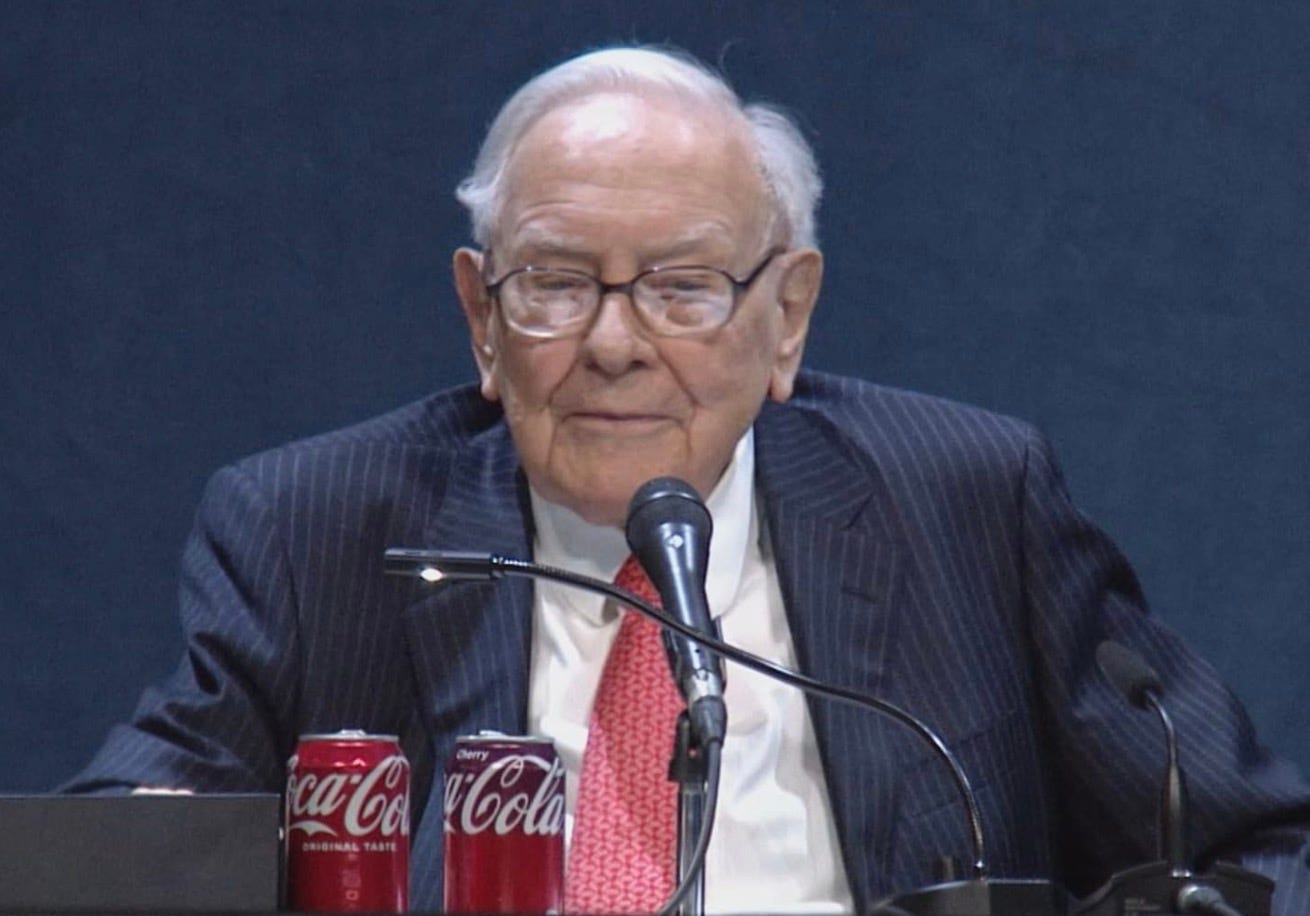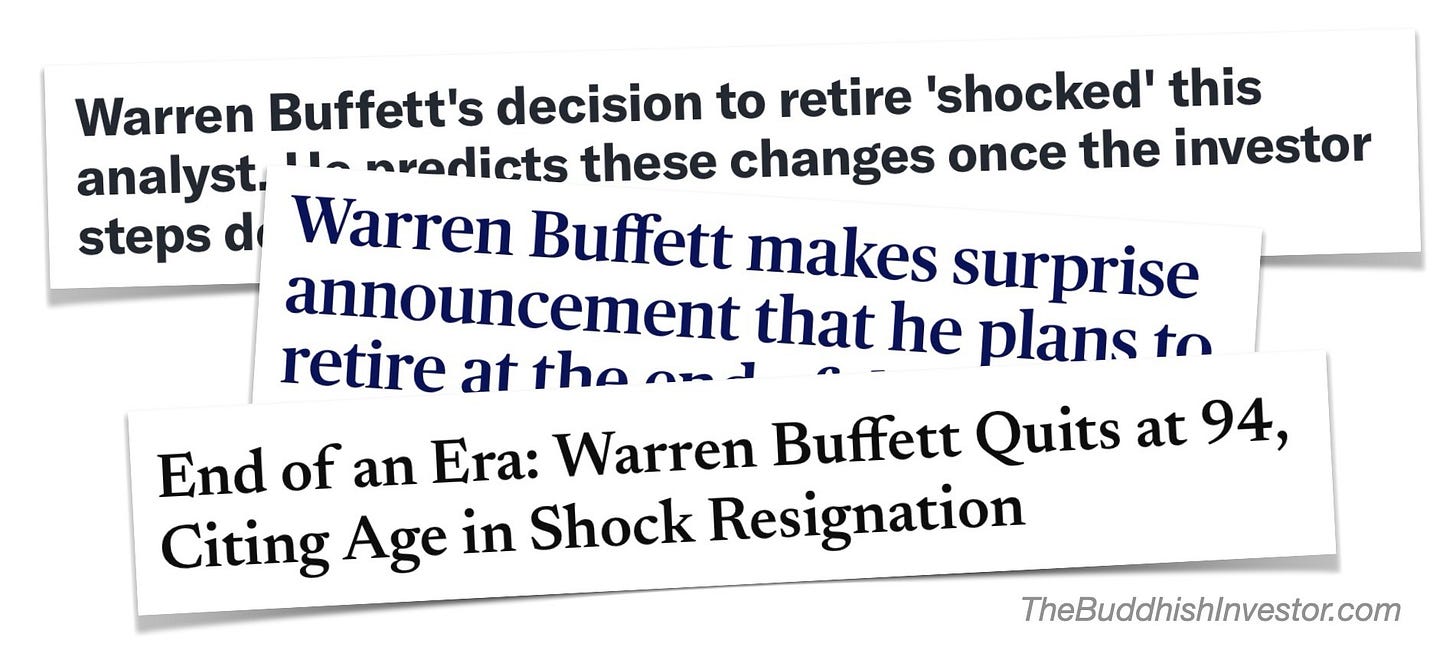Warren Buffett's Final Lesson
What the Oracle of Omaha's farewell teaches us about impermanence and gratitude
The collective gasp was almost audible.
When Warren Buffett announced at Berkshire Hathaway's annual shareholder meeting on May 3rd that he would step down as CEO by year's end, the reaction of the investing world was that of shock and surprise:
Everybody saw it coming, and no one did.
For over half a century, Buffett was Berkshire. Since 1970, he has transformed it from a struggling textile company into a trillion-dollar conglomerate. His name is woven into its fabric as tightly as Steve Jobs with Apple or Coco Chanel with Chanel.
To lose Buffett is to lose a piece of what Berkshire is.
And more than that, it is to be reminded that death waits for us all and impermanence is the rule, not the exception.
Denying death & impermanence
We do a good job of denying death in the Western world. We sanitize it with euphemisms—people "pass away" or are "lost" rather than dying. Most deaths happen hidden away in hospitals and care facilities. We pour billions into anti-aging treatments, desperately trying to outrun the inevitable.
Buffett's frank admission that he's too old and frail to continue running Berkshire cuts through this comfortable delusion. At 94, he's acknowledged the reality of physical decline while maintaining the mental clarity to recognize when it's time to let go.
This kind of honesty about mortality is jarring. Especially coming from someone we could always count on being around. He has been a constant in a world that is anything but. The same can be said for folks like Bob Dylan, the Dalai Lama, Willie Nelson, Clint Eastwood, Queen Elizabeth II and Buffett’s late buddy Charlie Munger.
Their constancy flies in the face of mortality and impermanence and helps lull us into a sense of complacency.
So when these icons eventually step back or pass away, we're genuinely shocked. The ground beneath our feet shifts. We're forced to confront the impermanence we've been so carefully avoiding.
Buffett’s Final Lesson
Buffett has always been generous with his wisdom:
"Be fearful when others are greedy and greedy when others are fearful"
"Time in the market beats timing the market"
“Most institutional and individual investors will find the best way to own common stock is through an index fund that charges minimal fees.”
These were lessons in money. But his resignation—a quiet, honest acknowledgment that his time is finite—might be his greatest lesson of all.
And every one of us would do well to be as honest with ourselves about our mortality as Buffett is. Even if we aren’t in our 9th decade of life.
Acknowledging death's inevitability opens the door to richer, more intentional living. We appreciate what we have because there will come a time when we don’t have it anymore.
This is what the Buddha was getting at when he coined the 5 Remembrances—5 things we should regularly remind ourselves of toward living a more fulfilled life:
I am of the nature to grow old. There is no way to escape growing old.
I am of the nature to have ill health. There is no way to escape having ill health.
I am of the nature to die. There is no way to escape death.
All that is dear to me and everyone I love are of the nature to change. There is no way to escape being separated from them.
My actions are my only true belongings.
The Buddha probably would’ve high-fived Buffett as he walked off the stage that day back in May.
The Oracle of Omaha schooled us all for the final time - not with a stock pick or market prediction, but with a master class in letting go and facing mortality head-on.
- The Buddh-ish Investor
I’d love to hear from you! Email at Sangha@TheBuddhishInvestor.com or drop a comment below!
Take home points:
Comfort in permanence is an illusion. We find reassurance in long-lasting figures like Buffett, Dylan, or other enduring leaders because their persistence creates a comforting sense of stability. But this comfort blinds us to the reality that everything—no matter how seemingly permanent—eventually ends.
Contemplating mortality enhances gratitude. Rather than waiting until we're forced to confront impermanence, actively thinking about our mortality now can help us appreciate what we have while we still have it. The shock of endings like Buffett's resignation reminds us that recognizing life's temporary nature makes everything more precious.
If you’re looking for more:
Another seeming immortal facing his own mortality—”It's not dark yet, but it's gettin' there”:
A powerful guided meditation from Noah Rasheta on impermanence




